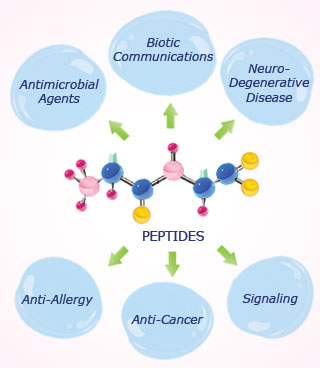
Peptide molecules have a wide array of functions and potential applications. (Image by MIT OpenCourseWare, adapted from Dr. Mohammed Shabab.)
Instructor(s)
Dr. Mohammed Shabab
MIT Course Number
7.347
As Taught In
Spring 2016
Level
Undergraduate
Course Description
Course Description
How do we sense hunger? How do we sense pain? What causes growth in our bodies? How are we protected from pathogens? The answer to many of these questions involves small polymers of amino acids known as peptides. Peptides are broadly used as signal molecules for intercellular communication in prokaryotes, plants, fungi, and animals. Peptide signals in animals include vast numbers of peptide hormones, growth factors and neuropeptides. In this course, we will learn about molecular bases of peptide signaling. In addition, peptides potentially can be used as potent broad-spectrum antibiotics and hence might define novel therapeutic agents.
This course is one of many Advanced Undergraduate Seminars offered by the Biology Department at MIT. These seminars are tailored for students with an interest in using primary research literature to discuss and learn about current biological research in a highly interactive setting. Many instructors of the Advanced Undergraduate Seminars are postdoctoral scientists with a strong interest in teaching.
Other Versions
Other OCW Versions
OCW has published multiple versions of this subject. ![]()


